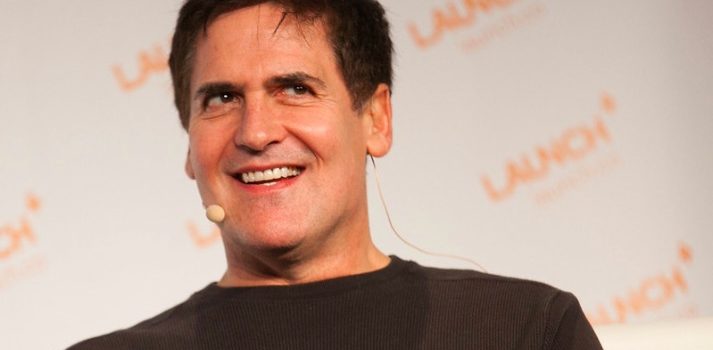

This article gives you a glimpse of what you can learn with Shortform. Shortform has the world’s best guides to 1000+ nonfiction books, plus other resources to help you accelerate your learning.
Want to learn faster and get smarter? Sign up for a free trial here .
If you’re looking for books that will help you succeed in business and better understand the world, look no further than the bookshelf of billionaire Mark Cuban. The Shark Tank star, entrepreneur, and investor is a famously avid reader: Cuban has attributed the first million dollars he made to reading, and he’s said that learning new skills is one of the top three qualities all billionaires share.
Mark Cuban’s recommended books list typically contains books on business, but he’s interested in a wide range of topics, and his recommended books reflect that. In 2017, Cuban told Politico, “I’m trying to keep up with what’s happening around the world. So my reading has been a little more eclectic than past summers.” Check out some of Mark Cuban’s favorite books here.
Don’t have as much time as Mark Cuban to read? That’s where Shortform comes in. With Shortform, you can get the key lessons from the best nonfiction books in minutes, not in hours. Our experts condense the key lessons from recommended books like these into an efficient summary. Check out our high-quality summaries of some of these 8 books to see if you can learn more quickly.
1. The Lean Startup: How Today’s Entrepreneurs Use Continuous Innovation to Create Radically Successful Businesses, by Eric Ries
TITLE: The Lean Startup
AUTHOR: Eric Ries
TIME: 36
READS: 39.7
IMG_URL: https://www.shortform.com/blog/wp-content/uploads/2020/01/leanstartup-cover.jpg
BOOK_SUMMARYURL: lean-startup-summary-eric-ries
AMZN_ID: B004J4XGN6
The Lean Startup by Eric Ries is considered a bible in the tech entrepreneurship community. It’s a methodology for creating businesses that focuses you on finding out what customers actually want. It uses concepts of scientific experimentation to prove that you’re making progress. It encourages you to launch as early and cheaply as possible so you don’t waste time and money.
Learn the critical concepts of the Minimum Viable Product, cohort metrics, A/B testing, virality, and startup pivots.
Mark Cuban repeatedly mentions The Lean Startup when asked about his favorite books.
2. Rework, by Jason Fried and David Heinemeier Hansson
Rework is the anti-business plan business plan. According to Jason Fried and David Heinemeier Hansson, you should ignore most of what you’ve heard about starting a business. They tell you why you shouldn’t pay attention to the competition, why you don’t need outside investors (or even an office), and why your planning isn’t doing you any good.
In his review of the book, Cuban said, “If given a choice between investing in someone who has read Rework or has an MBA, I’m investing in Rework every time. This is a must read for every entrepreneur.” Rework is one of the top Mark Cuban-recommended books.
3. The Innovator’s Dilemma: Why New Technologies Cause Great Firms to Fail, by Clayton Christensen
Clayton Christensen’s The Innovator’s Dilemma is one of the most influential leadership and business books of all time. In this classic, Christensen demonstrates why so many great companies fail to miss the opportunity to innovate, and in doing so, fail to thrive. Christensen has had fans throughout the business and publishing world, including Steve Jobs, Malcolm Gladwell, and Jeff Bezos.
Cuban recommended The Innovator’s Dilemma on the private messaging app Cyberdust, saying, “This helped me make sense of why things worked and didn’t work in the technology industry.”
4. Principles: Life and Work, by Ray Dalio
TITLE: Principles: Life and Work
AUTHOR: Ray Dalio
TIME: 59
READS: 33.8
IMG_URL: https://www.shortform.com/blog/wp-content/uploads/2020/01/principles_cover.jpg
BOOK_SUMMARYURL: principles-life-and-work-summary-ray-dalio
AMZN_ID: B071CTK28D
Ray Dalio is founder of Bridgewater Associates, the largest hedge fund in the world. In his book Principles, Dalio shares the guiding principles powering his success and Bridgewater’s.
Principles is a master class in rational thinking. The main theme is that finding truth is the best way to make decisions, and that ego, emotion, and blind spots prevent you from discovering the truth. Dalio shares his major strategies to circumvent these weaknesses, including radical open-mindedness, thoughtful disagreement, radical transparency, and believability-weighted decision making.
Mark Cuban said of Principles, “It’s the book I wish I had as a young entrepreneur, stressing over not knowing what I didn’t know. ‘Principles’ offers a bible to the greatest skill an entrepreneur can have, the ability to learn how to learn in any situation. Read it.” As Cuban believes that learning is the primary skill for success in business, it’s clear why Principles is one of the books Mark Cuban recommends most enthusiastically.
5. The Fountainhead, by Ayn Rand
The 1943 novel that started the philosophical school of Objectivism, The Fountainhead follows Howard Roark, a young architect who values his individualism and designs modernist buildings in spite of the rejection of the staid architectural establishment. The book is famous for celebrating man’s ego and individualism.
In 2006, Mark Cuban told C-SPAN that he’d read The Fountainhead “three complete times and untold number of little snippets and segments.” In another interview, he said of the book, “It encouraged me to think as an individual, take risks to reach my goals, and responsibility for my successes and failures. I loved it.” Cuban reportedly named one of his yachts after the book, making The Fountainhead one of the most visible Mark Cuban-recommended books.
6. White Working Class: Overcoming Class Cluelessness in America, by Joan C. Williams
The media tends to condescend to the white working class, particularly after its overwhelming support of Donald Trump in 2016. White Working Class explores why so many of the people guiding policy and the media in America are so naive about the white working class. The primary misconception is that “working class” means “poor”–it doesn’t. Another misconception is that racism is at the core of the white working class and their desire to make more money while maintaining their culture. Author Joan Williams presents a more nuanced sketch of a class that’s referenced frequently in the political and social spheres, but without understanding.
Cuban put White Working Class on his summer reading list in 2017, and he wrote the new foreword to the book’s 2019 edition, so it’s clear this is one of the top Mark Cuban-recommended books.
7. Our Mathematical Universe: My Quest for the Ultimate Nature of Reality, by Max Tegmark
Both a memoir of his discoveries and disappointments as a scientist and a treatise on his groundbreaking theories, Max Tegmark’s Our Mathematical Universe is a fascinating read. Tegmark believes that our reality is actually a mathematical structure, and that there are four levels of the multiverse–both theories could have an enormous impact on how researchers explore questions about the nature of our universe.
Cuban put Our Mathematical Universe on his summer reading list in 2018.
8. The Only Investment Guide You’ll Ever Need, by Andrew Tobias
This finance classic, first published over 40 years ago, has been a bestseller for decades. It’s valued for its practical and easy-to-understand tips about saving and investing, and the 2016 updated version makes it more relevant than ever.
In an interview, Mark Cuban cited The Only Investment Guide as one of the books that comprised his “personal road map.” He said, “They taught me what I needed to know and what I was going to do: I was going to bust my ass. And then I was going to retire and travel and party like a rock star by the time I was 35 years old. I did it by 30.”
He’s also said of The Only Investment Guide, “This is the only investment guide I have read that really made sense. Bottom line is that you can take a measure of risk on the $5,000 you have to invest in an attempt to earn 10% in the stock market, while praying that it all doesn’t disappear because someone bought too many yen derivatives. Or you can save 15% on the $5,000 a year you spend on replenishables, from toilet paper to cereal to who knows what, and put it in the bank on top of the original %5,000, earn an easy 5%, plus accrued interest, on the total and sleep very well at night.” This book changed Cuban’s life, making it one of the most highly-sought after Mark Cuban-recommended books.

Want to fast-track your learning? With Shortform, you’ll gain insights you won't find anywhere else .
Here's what you’ll get when you sign up for Shortform :
- Complicated ideas explained in simple and concise ways
- Smart analysis that connects what you’re reading to other key concepts
- Writing with zero fluff because we know how important your time is






